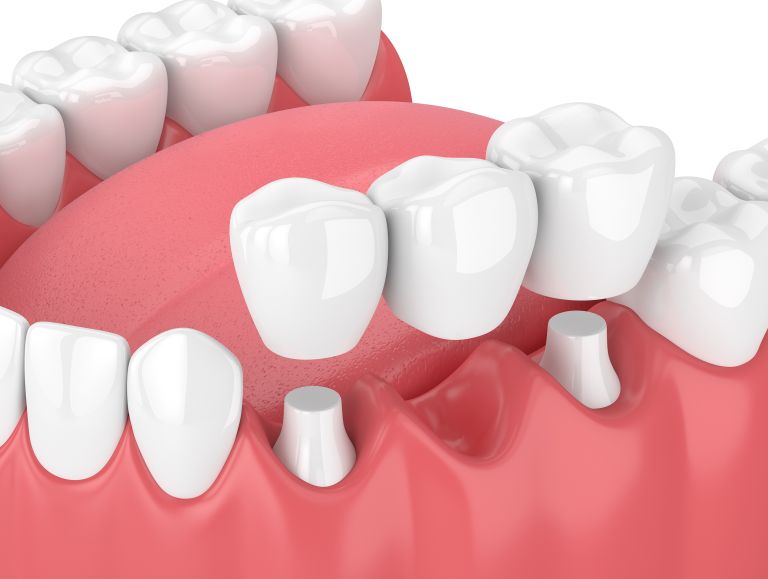Missing teeth can affect your confidence and your ability to eat and speak comfortably. At Smile Well Dentistry in Duncanville, TX, Dr. Nirmala Marneni offers dental bridges as an effective solution to replace one or more missing teeth. Dental bridges are custom-made restorations that fill the gap left by missing teeth, helping you restore both the function and appearance of your smile. If you’re looking for a reliable, natural-looking tooth replacement option, a dental bridge may be the right choice for you.

What is a Dental Bridge?
A dental bridge is a prosthetic device that replaces one or more missing teeth by anchoring to the surrounding natural teeth or dental implants. The bridge is made up of artificial teeth (called pontics) that fill the gap, while the adjacent teeth (called abutments) support the bridge, holding it securely in place. Dental bridges not only restore your smile but also help maintain the shape of your face, improve your bite, and prevent the remaining teeth from shifting out of place.
When to Consider a Dental Bridge
If you’re missing one or more teeth, a dental bridge may be the ideal solution for restoring your smile. Here are some situations where you may want to consider getting a dental bridge:
Missing One or More Teeth:
Dental bridges are an excellent option for patients missing one or more consecutive teeth. A bridge can replace the missing teeth and restore the function of your smile, making it easier to chew and speak.
Desire for a Fixed, Non-Removable Solution:
Unlike dentures, which are removable, dental bridges are permanently fixed in place, providing a stable and secure tooth replacement solution.
Prevent Teeth from Shifting:
When a tooth is lost, the surrounding teeth can begin to shift into the empty space, leading to misalignment and further dental problems. A dental bridge helps maintain the position of your remaining teeth, preserving your bite and oral health.
Restore Function and Aesthetics:
Missing teeth can make it difficult to chew certain foods and may affect your speech. A dental bridge restores these functions, allowing you to eat and speak comfortably while improving the aesthetics of your smile.
Avoid Bone Loss:
Although dental bridges do not directly stimulate the jawbone like dental implants, they help distribute the forces of chewing across the bite, which can help maintain some level of bone health and prevent further complications.
Types of Dental Bridges
At Smile Well Dentistry, we offer several types of dental bridges to meet the unique needs of our patients. Dr. Marneni will work with you to determine the best type of bridge for your oral health and specific condition:
Traditional Dental Bridges
Traditional dental bridges are the most common type of bridge and are used when you have natural teeth on either side of the gap. The adjacent teeth (abutment teeth) are prepared and fitted with crowns, which hold the artificial teeth (pontics) securely in place. Traditional bridges are strong and durable, providing a long-lasting solution for missing teeth.
Implant-Supported Bridges
For patients who do not have healthy natural teeth to support a traditional bridge, an implant-supported bridge may be the best option. This type of bridge is anchored to dental implants instead of natural teeth. Dental implants are surgically placed in the jawbone, and the bridge is attached to the implants for maximum stability and durability. Implant-supported bridges are an excellent option for patients who want a permanent solution that mimics the strength and function of natural teeth.
Cantilever Bridges
Cantilever bridges are used when there is only one natural tooth available to support the bridge. In this case, the bridge is anchored to a single abutment tooth, making it less common and suitable only for specific situations where one-sided support is sufficient.
Maryland Bridges (Resin-Bonded Bridges)
Maryland bridges are less invasive than traditional bridges, as they don’t require crowns on the abutment teeth. Instead, the pontic is attached using metal or porcelain wings that are bonded to the back of the adjacent teeth. Maryland bridges are typically used for replacing front teeth and are a more conservative option, though they may not be as strong as traditional bridges.
The Dental Bridge Process
Getting a dental bridge usually requires two visits to Smile Well Dentistry:
- Initial Consultation and Preparation:
During your first visit, Dr. Marneni will evaluate your oral health, discuss your tooth replacement options, and determine if a dental bridge is the best solution for you. If you’re getting a traditional bridge, the abutment teeth will be prepared by reshaping them to accommodate the crowns that will support the bridge.Impressions of your teeth will then be taken to create a custom bridge that fits perfectly with your bite. If you’re getting an implant-supported bridge, Dr. Marneni will schedule the placement of dental implants before the final bridge is attached.
- Placement of the Bridge:
Once your custom bridge is ready, it will be placed and adjusted for a comfortable fit. For traditional bridges, the crowns are placed over the abutment teeth, securing the bridge in place. For implant-supported bridges, the bridge is attached to the dental implants after they’ve integrated with the jawbone. Dr. Marneni will ensure that your bridge fits comfortably and looks natural, restoring both function and aesthetics to your smile.

Caring for Your Dental Bridge
With proper care, a dental bridge can last for many years. To ensure the longevity of your bridge, it’s important to maintain good oral hygiene habits, including:
- Brushing and Flossing: Brush twice a day and floss daily to keep your teeth, gums, and bridge clean. Special flossing tools can help you clean around the bridge and between the abutment teeth.
- Regular Dental Checkups: Regular visits to Smile Well Dentistry will help ensure that your bridge remains in good condition and that your oral health is properly maintained.
- Avoid Hard Foods: While dental bridges are durable, avoid chewing on hard objects or using your teeth as tools, as this can damage the bridge or surrounding teeth.
Restore Your Smile with a Custom Dental Bridge in Duncanville, TX
A dental bridge can restore your smile and improve your quality of life by providing a reliable and natural-looking tooth replacement solution. At Smile Well Dentistry, Dr. Nirmala Marneni offers personalized care and custom dental bridges to meet your specific needs. Whether you need a single tooth replacement or multiple teeth restored, we are here to help you achieve a healthy, beautiful smile.
If you’re ready to restore your smile with a dental bridge, contact Smile Well Dentistry in Duncanville, TX, today to schedule your consultation with Dr. Nirmala Marneni.